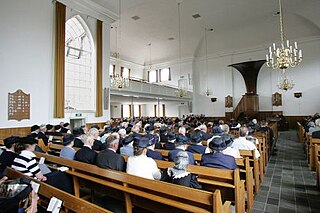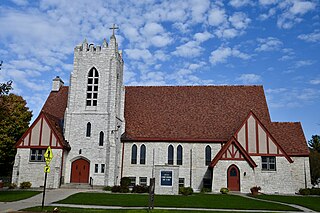Related Research Articles
Adventism is a branch of Protestant Christianity that believes in the imminent Second Coming of Jesus Christ. It originated in the 1830s in the United States during the Second Great Awakening when Baptist preacher William Miller first publicly shared his belief that the Second Coming would occur at some point between 1843 and 1844. His followers became known as Millerites. After Miller's prophecies failed, the Millerite movement split up and was continued by a number of groups that held different doctrines from one another. These groups, stemming from a common Millerite ancestor, collectively became known as the Adventist movement.

Many Christians observe a weekly day set apart for rest and worship called a Sabbath in obedience to Gods commandment to remember the Sabbath day, to keep it holy, usually on Sunday, the Lord's Day.

Seventh Day Baptists are Baptists who observe the Sabbath as the seventh day of the week, Saturday, as a holy day to God. They believe in conscious baptism of believers by immersion, congregational government and the scriptural basis of opinion and practice. They profess a statement of faith instituted on fundamental precepts of belief. Seventh Day Baptists rest on Saturday as a sign of obedience in a covenant relationship with God and not as a condition of salvation. Many, have adopted a Baptist covenant theology, based on the concept of regenerated society.

Messianic Judaism is a syncretic Abrahamist new religious movement or sect that considers itself Jewish. Many Jews and Jewish authority figures, both in the United States and Israel, consider it a part of Evangelical Christianity.
The United Seventh-Day Brethren is a small sabbatarian Adventist body.

Sabbath desecration is the failure to observe the Biblical Sabbath and is usually considered a sin and a breach of a holy day in relation to either the Jewish Shabbat, the Sabbath in seventh-day churches, or to the Lord's Day (Sunday), which is recognized as the Christian Sabbath in first-day Sabbatarian denominations.
Black Hebrew Israelites are a new religious movement claiming that African Americans are descendants of the ancient Israelites. Some sub-groups believe that Native and Latin Americans are descendants of the Israelites as well. Black Hebrew Israelites combine elements to their teaching from a wide range of sources to varying degrees. Black Hebrew Israelites incorporate certain aspects of the religious beliefs and practices of both Christianity and Judaism, though they have created their own interpretation of the Bible, and other influences include Freemasonry and New Thought, for example. Many choose to identify as Hebrew Israelites or Black Hebrews rather than Jews in order to indicate their claimed historic connections.
Christian observance of Passover is in modern times referred to as Holy Thursday or Maundy Thursday and is held the day before Good Friday. Sometimes a shortened Sedar meal is practiced. Many churches do a washing of the feet of the congregation on this day in recognition of Jesus washing the apostles feet at the last supper. [oremus Bible Browser : John 13:5–14] It marks the end of the Lenten season.

The Hebrew Roots Movement (HRM) is a syncretic religious movement that advocates adherence to the Torah and believe that Jesus, whom they often refer to by the Hebrew name Yeshua, is the Messiah. The movement emphasizes and promotes the belief that the Law of Moses was not abolished by Jesus and is, therefore, still in effect for his followers. Because HRM believes the Mosaic law is still active, it advocates the keeping of the seventh-day Sabbath; biblical feasts; laws of Kashrut; and circumcision. Some HRM followers also choose to wear tzitzit and other Jewish religious items. However, HRM followers do not generally follow Judaism or embrace the Talmud. Unlike other Christians, most HRM followers reject the traditional holidays of Christmas and Easter, insisting that they are pagan traditions.
In Seventh-day Adventist theology, there will be an end time remnant of believers who are faithful to God. The remnant church is a visible, historical, organized body characterized by obedience to the commandments of God and the possession of a unique end-time gospel proclamation. Adventists have traditionally equated this "remnant church" with the Seventh-day Adventist denomination.

The "three angels' messages" is an interpretation of the messages given by three angels in Revelation 14:6–12. The Seventh-day Adventist church teaches that these messages are given to prepare the world for the second coming of Jesus Christ, and sees them as a central part of its own mission.

In Abrahamic religions, the Sabbath or Shabbat is a day set aside for rest and worship. According to the Book of Exodus, the Sabbath is a day of rest on the seventh day, commanded by God to be kept as a holy day of rest, as God rested from creation. The practice of observing the Sabbath (Shabbat) originates in the biblical commandment "Remember the sabbath day, to keep it holy".

The seventh-day Sabbath, observed from Friday evening to Saturday evening, is an important part of the beliefs and practices of seventh-day churches. These churches emphasize biblical references such as the ancient Hebrew practice of beginning a day at sundown, and the Genesis creation narrative wherein an "evening and morning" established a day, predating the giving of the Ten Commandments. They hold that the Old and New Testament show no variation in the doctrine of the Sabbath on the seventh day. Saturday, or the seventh day in the weekly cycle, is the only day in all of scripture designated using the term Sabbath. The seventh day of the week is recognized as Sabbath in many languages, calendars, and doctrines, including those of Catholic, Lutheran, and Orthodox churches.[a]
This is a glossary of terms used in Christianity.

The Sabbath is a weekly day of rest or time of worship given in the Bible as the seventh day. It is observed differently in Judaism and Christianity and informs a similar occasion in several other faiths. Observation and remembrance of Sabbath is one of the Ten Commandments considered to be the fourth in Judaism, Eastern Orthodoxy, and most Protestant traditions, and the third in Roman Catholic and Lutheran traditions.

"Remember the Sabbath day, to keep it holy" is one of the Ten Commandments found in the Torah.

Some Christian groups incorporate Jewish holidays into their religious practice, typically altering and reinterpreting their observation to suit a supersessionist theology.

Sabbatarianism advocates the observation of the Sabbath in Christianity, in keeping with the Ten Commandments.
The Pillars of Adventism are landmark doctrines for Seventh-day Adventists. They are Bible doctrines that define who they are as a people of faith; doctrines that are "non-negotiables" in Adventist theology. The Seventh-day Adventist church teaches that these Pillars are needed to prepare the world for the second coming of Jesus Christ, and sees them as a central part of its own mission. Adventists teach that the Seventh-day Adventist Church doctrines were both a continuation of the reformation started in the 16th century and a movement of the end time rising from the Millerites, bringing God's final messages and warnings to the world.
References
- 1 2 Olson, Roger E.; Mead, Frank S.; Hill, Samuel S.; Atwood, Craig D. (2018) [1951]. "Adventist and Sabbatarian (Hebraic) Churches". Handbook of Denominations in the United States (14th [updated] ed.). Nashville, Tn: Abingdon Press. ISBN 9781501822513.
- ↑ Sanford, Don A. (1992). A Choosing People: The History of Seventh Day Baptists. Nashville, Tn: Broadman Press. ISBN 0-8054-6055-1.
- ↑ Spector, Stephen (2008). Evangelicals and Israel. Oxford University Press. p. 116. ISBN 978-0195368024. LCCN 2008026681.
- ↑ Dynner, Glenn (2011). Holy Dissent: Jewish and Christian Mystics in Eastern Europe. Wayne State University Press. pp. 358–9. ISBN 9780814335970.
- ↑ Popov, Igor (2017). Buku rujukan semua aliran dan perkumpulan agama di Indonesia [The Reference Book on All Religious Branches and Communities in Indonesia] (in Indonesian). Singaraja: Toko Buku Indra Jaya. pp. 41–42.
- ↑ Remnant Fellowship
- ↑ "Seventh-day Remnant". Sdrvoice.org. July 10, 2013. Archived from the original on May 4, 2015. Retrieved November 20, 2017.